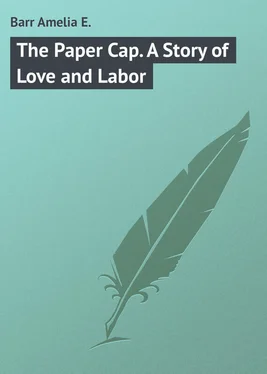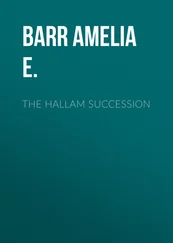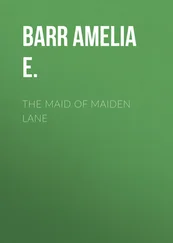Amelia Barr - The Paper Cap. A Story of Love and Labor
Здесь есть возможность читать онлайн «Amelia Barr - The Paper Cap. A Story of Love and Labor» — ознакомительный отрывок электронной книги совершенно бесплатно, а после прочтения отрывка купить полную версию. В некоторых случаях можно слушать аудио, скачать через торрент в формате fb2 и присутствует краткое содержание. ISBN: , Жанр: foreign_prose, на английском языке. Описание произведения, (предисловие) а так же отзывы посетителей доступны на портале библиотеки ЛибКат.
- Название:The Paper Cap. A Story of Love and Labor
- Автор:
- Жанр:
- Год:неизвестен
- ISBN:http://www.gutenberg.org/ebooks/50089
- Рейтинг книги:5 / 5. Голосов: 1
-
Избранное:Добавить в избранное
- Отзывы:
-
Ваша оценка:
- 100
- 1
- 2
- 3
- 4
- 5
The Paper Cap. A Story of Love and Labor: краткое содержание, описание и аннотация
Предлагаем к чтению аннотацию, описание, краткое содержание или предисловие (зависит от того, что написал сам автор книги «The Paper Cap. A Story of Love and Labor»). Если вы не нашли необходимую информацию о книге — напишите в комментариях, мы постараемся отыскать её.
The Paper Cap. A Story of Love and Labor — читать онлайн ознакомительный отрывок
Ниже представлен текст книги, разбитый по страницам. Система сохранения места последней прочитанной страницы, позволяет с удобством читать онлайн бесплатно книгу «The Paper Cap. A Story of Love and Labor», без необходимости каждый раз заново искать на чём Вы остановились. Поставьте закладку, и сможете в любой момент перейти на страницу, на которой закончили чтение.
Интервал:
Закладка:
“Git out! Git out! Will tha? If tha doesn’t, I’ll fling thee out like any other rubbish;” and as the man made no attempt to obey the command given, Hartley took him by the shoulder, and in spite of his protestations – received with general jeers and contempt – put him outside the chapel.
Squire Annis heartily approved the word, act and manner of Hartley’s little speech. The temperature of his blood rose to fighting heat, and he wanted to shout with the men in the body of the chapel. Yet his countenance was calm and placid, for Antony Annis was Master at Home , and could instantly silence or subdue whatever his Inner Man prompted that was improper or inconvenient.
He thought, however, that it was now a fit time-for him to withdraw, and he was going to say the few words he had so well considered, when a very old man rose, and leaning on his staff, called out, “Squire Annis, my friend, I want thee to let me speak five minutes. It will varry likely be t’ last time I’ll hev the chance to say a word to so many lads altogether in this life.” And the squire smiled pleasantly as he replied, “Speak, Matthew, we shall all be glad to listen to you.”
“Ill be ninety-five years old next month, Squire, and I hev been busy wi’ spinning and weaving eighty-eight o’ them. I was winding bobbins when I was seven years old, and I was carding, or combing, or working among wool until I was twenty. Then I got married, and bought from t’ squire, on easy terms, my cottage and garden plot, and I kept a pig and some chickens, and a hutch full o’ rabbits, which I fed on the waste vegetables from my garden. I also had three or four bee skeps, that gave us honey for our bread, with a few pounds over to sell; t’ squire allays bought the overbit, and so I was well paid for a pretty bed of flowers round about the house. I was early at my loom, but when I was tired I went into my garden, and I smoked a pipe and talked to the bees, who knew me well enough, ivery one o’ them. If it was raining, I went into t’ kitchen, and smoked and hed a chat wi’ Polly about our awn concerns. I hev had four handsome lassies, and four good, steady lads. Two o’ the lads went to America, to a place called Lowell, but they are now well-to-do men, wi’ big families. My daughters live near me, and they keep my cottage as bright as their mother kept it for over fifty years. I worked more or less till I was ninety years old, and then Squire Annis persuaded me to stop my loom, and just potter about among my bees and flowers. Now then, lads, thousands hev done for years and years as much, even more than I hev done and I hev never met but varry few Home-loom weavers who were dissatisfied. They all o’ them made their awn hours and if there was a good race anywhere near-by they shut off and went to it. Then they did extra work the next day to put their ‘piece’ straight for Saturday. If their ‘piece’ was right, the rest was nobody’s business.”
“Well, Matthew,” said the squire, “for many a year you seldom missed a race.”
“Not if t’ horses were good, and well matched. I knew the names then of a’ the racers that wer’ worth going to see. I love a fine horse yet. I do that! And the Yorkshire roar when the victor came to mark! You could hear it a mile away! O squire, I can hear it yet!
“Well, lads, I hev hed a happy, busy life, and I hev been a good Methodist iver sin’ I was converted, when I was twelve years old. And I bear testimony this day to the goodness and the faithfulness of God. He hes niver broken a promise He made me. Niver one!
“Thousands of Home-loom spinners can live, and have lived, as I did and they know all about t’ life. I know nothing about power-loom weaving. I dare say a man can make good or bad o’ it, just as he feels inclined; but I will say, it brings men down to a level God Almighty niver intended. It is like this – when a man works in his awn home, and makes his awn hours, all the world, if he be good and honest, calls him A Man ; when he works in a factory he’s nobbut ‘ one o’ the hands .’”
At these words Matthew sat down amid a little subdued inexpressible mixture of tense feeling and the squire said – “In three weeks or less, men, I am going to London, and I give you my word, that I shall always be found on the side of Reform and Free Trade. When I return you will surely have made up your minds and formed some sort of decision; then I will try and forward your plans to my last shilling.” With these words he bowed to the gentlemen on the platform, and the audience before him, and went rapidly away. His servant was at the Chapel door with his horse; he sprang into the saddle, and before anyone could interrupt his exit, he was beyond detention.
A great disturbance was in his soul. He could not define it. The condition of his people, the changing character of his workers and weavers, the very village seemed altered, and then the presence of Bradley! He had found it impossible to satisfy both his offense with the man and his still vital affection for him. He had often told himself that “Bradley was dead and buried as far as he was concerned”; but some affections are buried alive, and have a distressing habit of being restless in their coffins. It was with the feeling of a fugitive flying for a place of rest that he went home. But, oh, how refreshing was his wife’s welcome! What comfort in her happy smile! What music in her tender words! He leaped to the ground like a young man and, clasping her hand, went gratefully with her to his own fireside.
CHAPTER IV – LONDON AND AUNT JOSEPHA
“Still in Immortal Youth we dream of Love.”
London – “Together let us beat this ample field
Try what the open and the covert yield.”
KATHERINE’S letters bore little fruit. Lady Brierley sent fifty pounds to buy food, but said “she was going to Bourmouth for the spring months, being unable to bear the winds of the Yorkshire wolds at that time.” Mrs. Craven and Mrs. Courtney were on their way to London, and Mrs. Benson said her own large family required every hour of her time, especially as she was now only able to keep one servant. So the village troubles were confided to the charge of Faith Foster and her father. The squire put a liberal sum of money with the preacher, and its application was left entirely to his judgment.
Nor did Annis now feel himself able to delay his journey until April. He was urged constantly by the leaders of the Reform Bill to hasten his visit to the House. Letters from Lord Russell, Sir James Grahame and Lord Grey told him that among the landlords of the West Riding his example would have a great influence, and that at this “important crisis they looked with anxiety, yet certainty, for his support.”
He could not withhold it. After his enlightenment by Mr. Foster, he hardly needed any further appeal. His heart and his conscience gave him no rest, and in ten days he had made suitable arrangements, both for the care of his estate, and the relief of the village. In this business he had been greatly hurried and pressed, and the Hall was also full of unrest and confusion, for all Madam’s domestic treasures were to pack away and to put in strict and competent care. For, then, there really were women who enjoyed household rackets and homes turned up and over from top to bottom. It was their relief from the hysteria of monotony and the temper that usually attends monotony. They knew nothing of the constant changes and pleasures of the women of today – of little chatty lunches and theater parties; of their endless societies and games, and clubs of every description; of fantastic dressing and undressing from every age and nation; beside the appropriation of all the habits and pursuits and pleasures of men that seemed good in their eyes, or their imaginations.
Читать дальшеИнтервал:
Закладка:
Похожие книги на «The Paper Cap. A Story of Love and Labor»
Представляем Вашему вниманию похожие книги на «The Paper Cap. A Story of Love and Labor» списком для выбора. Мы отобрали схожую по названию и смыслу литературу в надежде предоставить читателям больше вариантов отыскать новые, интересные, ещё непрочитанные произведения.
Обсуждение, отзывы о книге «The Paper Cap. A Story of Love and Labor» и просто собственные мнения читателей. Оставьте ваши комментарии, напишите, что Вы думаете о произведении, его смысле или главных героях. Укажите что конкретно понравилось, а что нет, и почему Вы так считаете.












